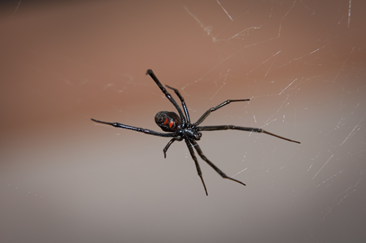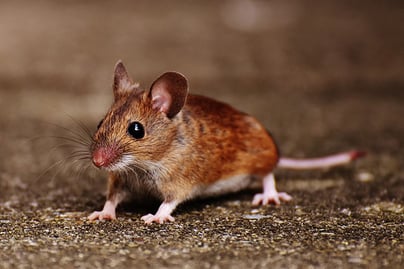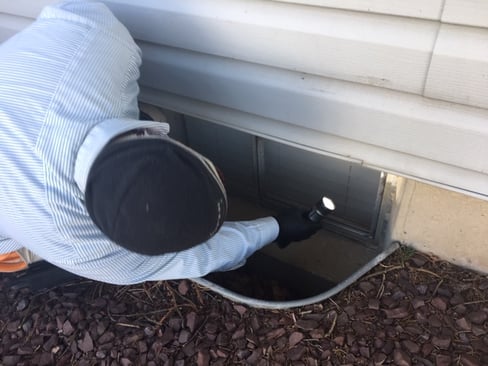As fall comes to a close and the holidays are right around the corner, you might think that you’re safe from the bugs that invaded your house during the spring and summer. The truth is, pests don’t let up in the winter, they just change focus in terms of survival.
Many pests including spiders, rodents, and stink bugs can survive the seasonal shift from fall to winter in New Jersey and Eastern Pennsylvania. It’s true that you don’t have to deal with as many insects when it’s cold outside, but that doesn’t mean it’s time to let up on pest control measures to keep your family safe.
What pests are active in the winter?
Insects and rodents are able to live indoors when there is access to heat and a place to hide. Otherwise, they would most likely perish after the first frost. If there is a viable food source, they are even more likely to cohabitate. Be on the lookout for the following common indoor winter pests.
Spiders
Spiders are one of the most feared pests that homeowners have to content with year-round. Unfortunately, spiders don’t disappear during the winter. You can still come across spiders in your basement, bathroom, garage, and other living spaces, even when the weather outside is frightful. Most spiders that you’ll find in your home are going to be either wolf spiders, cellar spiders, or house spiders. None of these are poisonous to humans, so they’re more of a nuisance to those who are bothered by their presence.

Pictured Above: Female Black Widow Spider
On the other hand, less common spiders like brown recluse spiders and black widow spiders can be dangerous. Black widow bites can cause fever, increased blood pressure, sweating, and nausea. As long as proper medical treatment is sought promptly, fatalities from a black widow spider bite is unlikely. Brown recluse spiders are not native to New Jersey or Pennsylvania. That’s not to say that you will never find one hiding in your home. They are more common in the mid-west as opposed our region. If you receive a package with a brown recluse spider inside and it travels into your basement, it can still live and thrive. Their bites can lead to muscle spasms and other adverse effects, but that’s if this unlikely scenario were to happen.
Rodents

Mice are prevalent in our area, and make their way into homes during the fall and winter. Common house mice can squeeze through spaces you may not think about until you find droppings. Because they have collapsible bodies, something as innocuous as a crack in your foundation or tiny gaps around your basement windows could be drawing mice indoors. They follow air currents that flow in and out of your house to get inside. Once they are indoors, all they need is a food source (pantry items in your kitchen or seeds in your garage) and a place to hide. Mice are nocturnal, so the chances of you seeing them are slim. Droppings are the main indicator of mice.
Stink Bugs
Living in silence, stink bugs rest in chimneys and wall voids during the winter. You may not even know that you have stink bugs in your home because they hide so well. Stink bugs live outdoors during the spring and summer, only living within the walls of homes and commercial buildings once it starts cooling down usually starting around October. This can vary depending on how cool or warm of an early fall we have. Because your house harbors warmth, stink bugs are drawn in to set up shop until spring. Many homeowners think that they have a big stink bug problem in the spring, when in reality, they are just witnessing stink bugs leaving to live outdoors. Stink bugs aren’t especially dangerous. They won’t eat wood or physically destroy your home. Many other pests behave in a similar way, including ladybugs and boxelder bugs.
Why are there bugs in my house when it’s cold outside?
Bugs and rodents live indoors during the winter because they are trying to escape the cold. Bugs like spiders aren’t built to withstand freezing temperatures. Their tiny bodies need shelter in order to live and thrive. Residential homes provide that needed space because of our climate controlled houses.
How can I winterize my home against pests?

Planning ahead for winter pest prevention is one of the smartest things you can do as a homeowner. Use the following tips to prevent winter pests from infesting your home.
- Inspect the foundation and exterior of your home. Are there gaps or cracks? Seal them to prevent potential entry points.
- Repair and replace broken or aging vents.
- Keep your kitchen tidy. Pests are drawn indoors by seeking heat, but they stay once they find food.
- Repair any appliances suffering from water damage. This can include dishwashers and sinks.
- Schedule a professional pest inspection. Pest management professionals are trained to search for vulnerabilities in your home that can make your house more susceptible to winter pest activity.
How can Cooper prevent winter pests from getting into my home?
The Home Intensive Plan is designed to provide preventive pest and rodent control for your home, year round. This is our most popular service for homeowners. The service plan includes four preventive services per year. Each service is unique and will be accompanied by a detailed 30-point inspection report with detailed findings as well as providing you with important recommendations for your home. Each year you will receive three exterior maintenance services (March – November) and one interior service (December – February). The winter service will focus on the interior of the structure and is geared towards rodents and other pests that may live within the structure.
Home Intensive & Home Traditional Plans are both available for purchase online! Schedule service online for contactless checkout and fast technician dispatch by clicking the button below.
The Home Traditional Plan is a substantial value for the homeowner that does not want to be bothered by crawling insects, mice, and wasps. The Home Traditional Plan provides preventive pest and rodent control for your home, year round. As part of your plan, you will receive four services per year. Each year you will receive three exterior maintenance services (March – November) and one interior service (December – February). There are some exclusions in the Home Traditional Plan when compared to the Home Intensive Plan.
If you experience recurring problems with mice, squirrels, or other rodents getting into your house, a permanent (and highly recommended) solution is available from Cooper Pest Solutions. Since rodents can squeeze into the tiniest of places, older home structures often have many gaps that rodents find very attractive, and this is how they enter your home. To learn more about Cooper’s Rodent Exclusion Services, click here.
For maximum coverage, Cooper’s Stink Bug Prevention Program is only available August 15th-September 30th. The goal is to provide service before the first frost. This service is not a reactive plan to eliminate current stink bug activity. The best way to avoid a residential stink bug infestation is to prevent them from entering before they arrive. To learn more about our Stink Bug Prevention Program, click here.
Call us or fill out the contact form on this page to speak with our specialists about winter pest prevention for your home!


